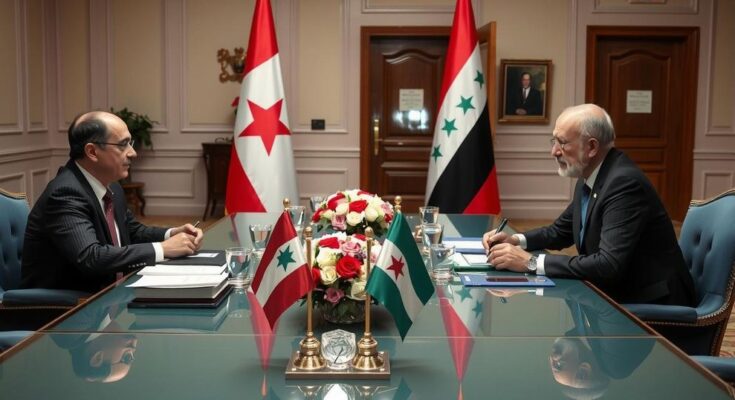Jordan’s Foreign Minister Ayman Safadi met with Syrian leader Ahmed al-Sharaa on December 23, marking a significant diplomatic engagement. Jordan is focused on securing its northern border amid historical complexities and recent developments following the Assad regime’s collapse. The U.S. presence at the Tanf garrison further complicates regional security issues, highlighting Jordan’s strategic interests.
On December 23, Jordanian Foreign Minister Ayman Safadi engaged in diplomatic discussions with new Syrian leader Ahmed al-Sharaa following the recent collapse of the Assad regime. This meeting holds significant importance due to Jordan’s geographic proximity and its historical ties with Syria, highlighting the shifting landscape in regional politics. Al-Sharaa has been a key figure in welcoming delegations from various countries, reflecting a renewed interest in Syria following the regime’s downfall.
Jordan’s quest for a stable northern border is paramount, particularly given the influx of Syrian refugees during the civil war and ongoing security concerns. The Jordanian government has reiterated its commitment to the security and unity of Syria, aiming to bolster its institutions while responding to regional instability caused by conflicts.
Additionally, the United States maintains a strategic presence in the region through the Tanf garrison, which plays a role in training Syrian rebels. This military post is poised to influence Jordan’s security dynamics as it deals with Iranian-backed threats and the aftermath of the Assad regime. Jordan’s historical connections to Syria and past conflicts underscore the complexity of their relationship, which is now undergoing a re-evaluation in light of recent developments.
The recent meeting between Jordan’s Foreign Minister Ayman Safadi and Syrian leader Ahmed al-Sharaa marks a pivotal shift in Jordan’s strategy towards its neighbor Syria, especially following the downfall of Bashar al-Assad. Historically, Jordan has experienced challenges related to refugee influx, security concerns due to the Syrian civil war, and the fight against ISIS. These factors have necessitated a reevaluation of Jordan’s foreign relations concerning Syria, particularly as new authorities seek to stabilize the region and manage security threats along their borders.
In summary, Jordan’s outreach to the new Syrian leadership reflects the complexities of the post-Assad political landscape and Jordan’s strategic interests in northern border security. As Jordan navigates its historical ties, refugee management, and security challenges, the evolving situation in Syria will significantly influence regional stability and Jordan’s relations with both Syria and international allies.
Original Source: www.jpost.com




